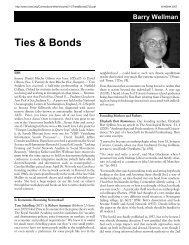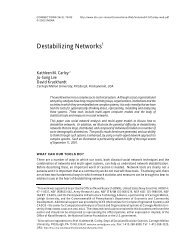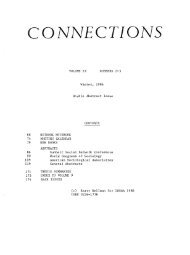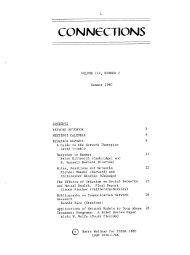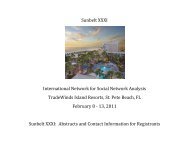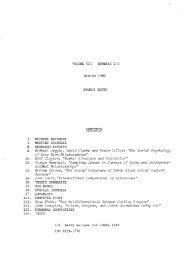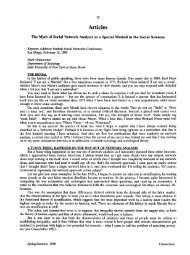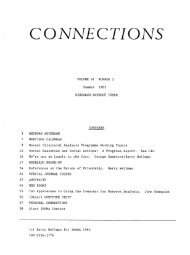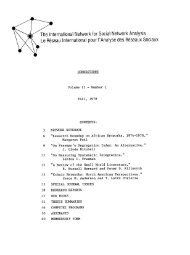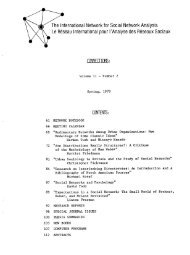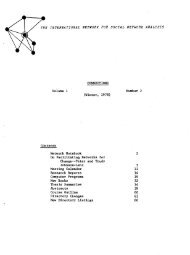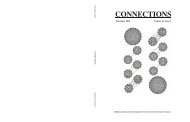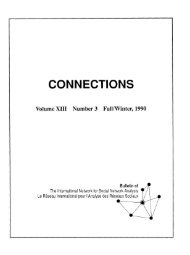Text Analysis of the Social Capital Literature Network ... - INSNA
Text Analysis of the Social Capital Literature Network ... - INSNA
Text Analysis of the Social Capital Literature Network ... - INSNA
You also want an ePaper? Increase the reach of your titles
YUMPU automatically turns print PDFs into web optimized ePapers that Google loves.
4<br />
ANNOUNCEMENTS<br />
research and education environment in which<br />
students and faculty can engage in <strong>the</strong> ethical<br />
conduct <strong>of</strong> high impact research building on<br />
both computer science and social science in a<br />
state-<strong>of</strong>-<strong>the</strong>-art intelligent and wireless <strong>of</strong>fice<br />
and classroom <strong>of</strong> <strong>the</strong> future . CASOS aims to<br />
foster multidisciplinary research on high impact<br />
projects by :<br />
[1] Identifying and supporting new directions<br />
and unexploited synergies within <strong>the</strong> CMU<br />
community by linking <strong>the</strong> social / organizational<br />
community and <strong>the</strong> engineering /<br />
computer science community .<br />
[2] Providing a forum for disseminating new<br />
results both within and beyond CMU .<br />
[3] Fostering research linkages between CMU<br />
and <strong>the</strong> University <strong>of</strong> Pittsburgh,<br />
[4] Providing an interface to industry and<br />
government for multidisciplinary work that<br />
combines social and computational analysis .<br />
[5] Enhancing graduate education by providing<br />
a multidisciplinary education and research<br />
infrastructure that combines social science and<br />
computational science .<br />
Current Research Thrusts - There are a<br />
number <strong>of</strong> ongoing research projects in<br />
CASOS that are focused on :<br />
1) Organizational Design - This is a large<br />
area comprised <strong>of</strong> a number <strong>of</strong> projects<br />
including those on : searching for fundamental<br />
principles <strong>of</strong> organizing, coordination and<br />
cooperation ; large scale qualitative simulation ;<br />
comparison and extension <strong>of</strong> constraint based<br />
optimization for extremely complex and<br />
dynamically changing performance surfaces ;<br />
optimal and flexible coordination structures<br />
for different types <strong>of</strong> agents (humans,<br />
corporations, WebBots, or robots) and tasks ;<br />
virtual testbeds for determining <strong>the</strong> social<br />
impacts <strong>of</strong> information technology and its<br />
prospects for diffusion, organizational and<br />
multiagent learning ; trade<strong>of</strong>fs between agent<br />
quantity and computational complexity,<br />
developing tool kits for designing and building<br />
agent based models <strong>of</strong> organizations, teams,<br />
markets, and social systems .<br />
2) Adaptation and Evolution - Faculty<br />
interests in this area include individual, group,<br />
organizational and machine learning .<br />
Research is done to develop new concepts,<br />
<strong>the</strong>ories, and knowledge about organizing and<br />
organization, coordination, adaptation, and<br />
evolution at <strong>the</strong> agent, machine, group,<br />
network, organization, market, institution, and<br />
societal level . Three areas <strong>of</strong> particular<br />
attention include : adaptive multi-agent<br />
models, artificial life, societies and organizations,<br />
and organizational learning .<br />
3) <strong>Social</strong> and Organizational <strong>Network</strong>s -<br />
Faculty interests here include empirical<br />
analysis, development <strong>of</strong> simulation and<br />
network based tools and metrics that can be<br />
used within and among organizations to better<br />
measure and manage <strong>the</strong> interlocked activities<br />
<strong>of</strong> people and intelligent technologies in terms<br />
<strong>of</strong> <strong>the</strong>ir communication and knowledge networks,<br />
team mental models and group effectiveness<br />
. Work includes <strong>the</strong> development <strong>of</strong><br />
empirically driven <strong>the</strong>ory in <strong>the</strong> areas <strong>of</strong><br />
diffusion, adaptive and evolutionary social<br />
networks, knowledge networks, and inter-and<br />
intra-organizational networks .<br />
4) Electronic Commerce-A large number <strong>of</strong><br />
research projects are being carried out<br />
focusing on agent based models to develop<br />
tools to facilitate and evaluate electronic<br />
commerce . Specific topics include intelligent<br />
broker agents, trust and e-commerce, and<br />
locating <strong>the</strong> determinants <strong>of</strong> <strong>the</strong> economic<br />
success or failure <strong>of</strong> attempts to sell or buy<br />
goods and services on <strong>the</strong> internet .<br />
5) Vulnerability <strong>Analysis</strong> - Research here<br />
includes developing simulation, multi-agents,<br />
social network models for critical<br />
infrastructure analysis, vulnerability analysis<br />
and information security. A second project is<br />
in development <strong>of</strong> socially sophisticated



